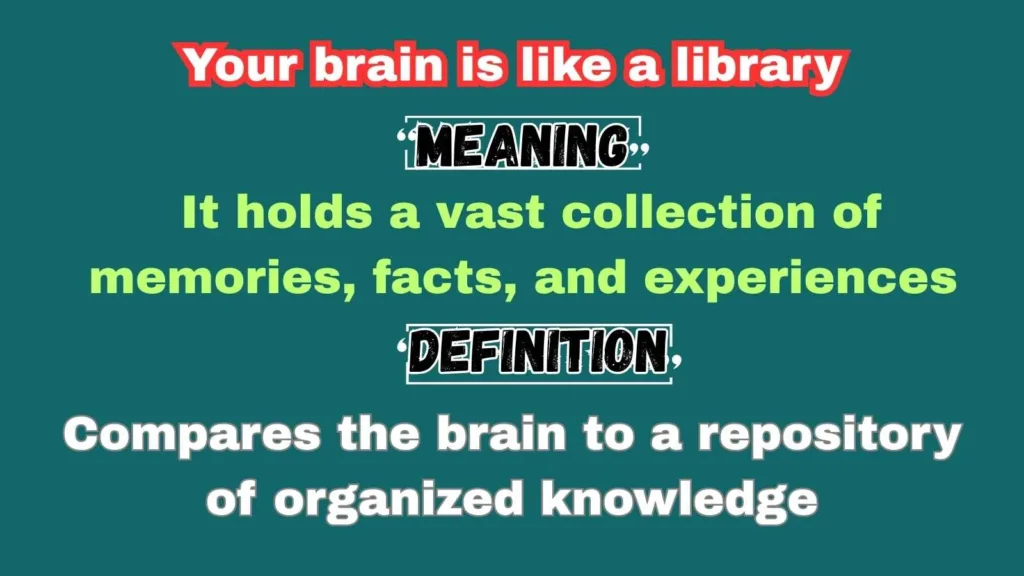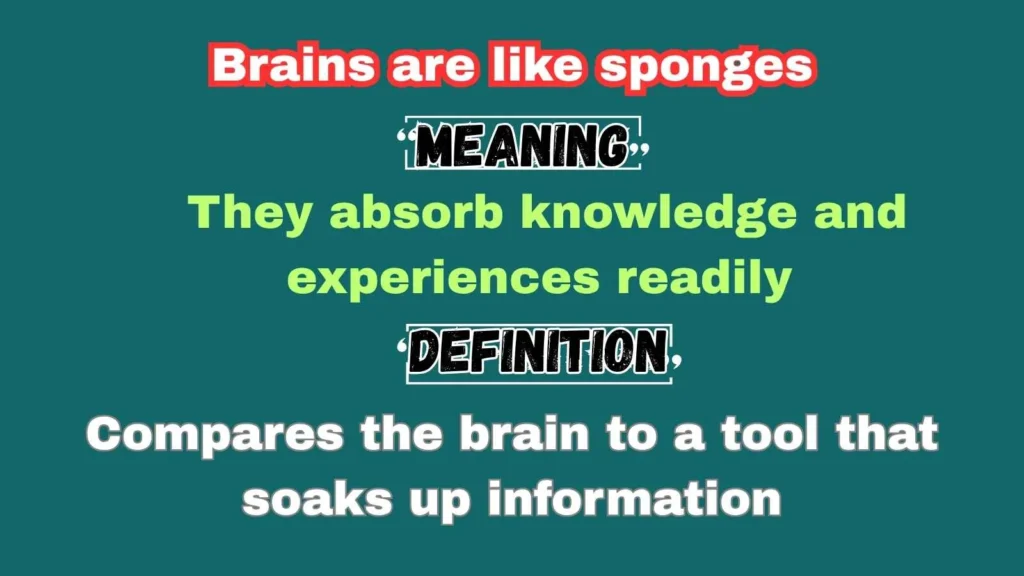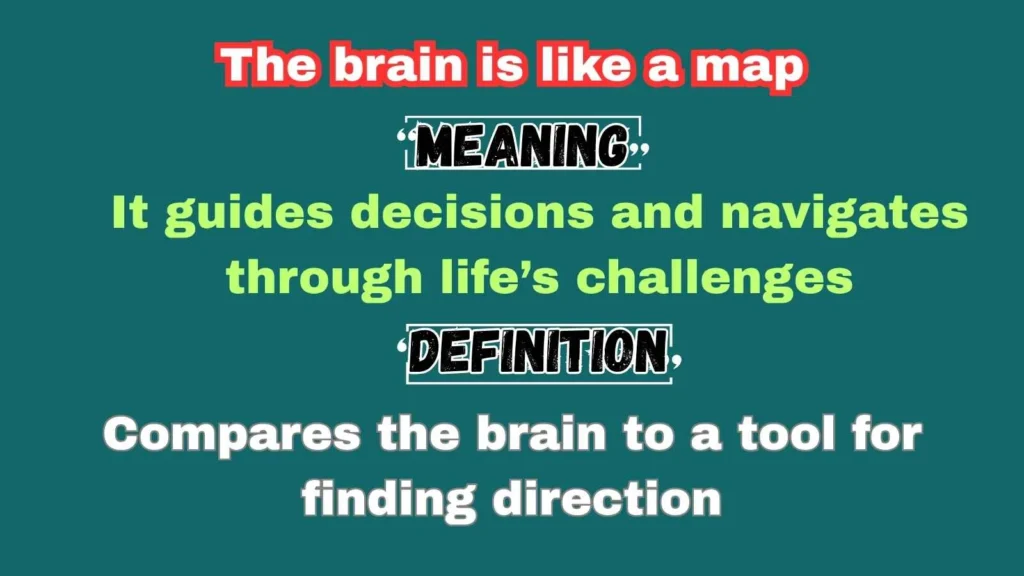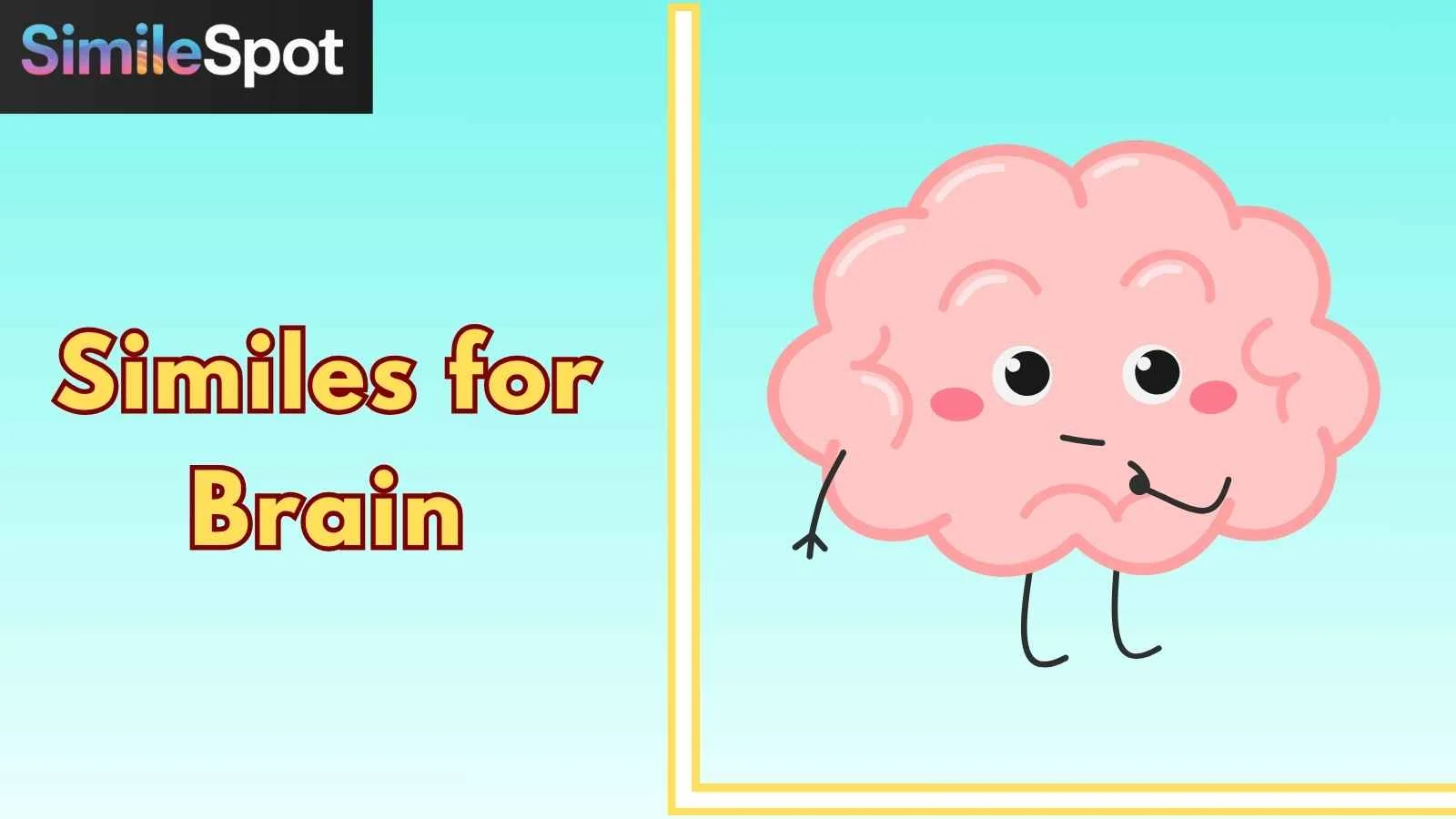Similes paint vivid pictures by comparing two unlike things using “like” or “as,” making language colorful and relatable. The brain, a fascinating organ that powers thought, creativity, and emotion, deserves descriptions as dynamic as its functions.
Exploring similes for the brain not only sparks imagination but also deepens our appreciation for its complexity. Whether you’re a writer, student, or curious mind, these comparisons will inspire you to see the brain in new ways.
Read on to discover a vibrant collection of similes that capture the brain’s brilliance and ignite your creative spark!
Quick Definition of a Simile
A simile is a figure of speech that compares two different things using “like” or “as” to create a vivid image. It enhances descriptions by making them more engaging and relatable.
Table of 5 Quick Similes
| Simile | Meaning | Example Sentence |
|---|---|---|
| The brain is like a supercomputer | It processes information rapidly and efficiently | Her brain worked like a supercomputer, solving complex problems in seconds. |
| The brain is like a bustling city | It’s a hub of activity with countless connections | His brain buzzed like a bustling city, alive with ideas day and night. |
| The brain is like a library | It stores vast amounts of knowledge | My brain feels like a library, packed with memories and facts. |
| The brain is like a puzzle | It pieces together thoughts and ideas | Her brain worked like a puzzle, fitting clues together seamlessly. |
| The brain is like a conductor | It directs thoughts and actions harmoniously | His brain acted like a conductor, orchestrating every decision with precision. |
The brain is like a supercomputer
Meaning: The brain processes information at incredible speeds, handling complex tasks effortlessly.
Definition: A comparison to a high-speed machine that computes and solves problems.
- Example 1: Her brain was like a supercomputer, analyzing data faster than any software.
- Example 2: When solving math problems, his brain hummed like a supercomputer in overdrive.
A brain is like a bustling city
Meaning: It’s a vibrant hub where thoughts, ideas, and memories connect constantly.
Definition: Likens the brain to a lively urban center with endless activity.
- Example 1: Her brain buzzed like a bustling city, with ideas flowing like traffic.
- Example 2: His brain felt like a bustling city, never sleeping as thoughts raced through.
Your brain is like a library

Meaning: It holds a vast collection of memories, facts, and experiences.
Definition: Compares the brain to a repository of organized knowledge.
- Example 1: My brain is like a library, storing every book I’ve ever read.
- Example 2: Her brain worked like a library, retrieving facts with pinpoint accuracy.
This brain is like a puzzle
Meaning: It connects thoughts and ideas to form a complete picture.
Definition: Equates the brain to a jigsaw that assembles solutions.
- Example 1: His brain was like a puzzle, piecing together clues to solve mysteries.
- Example 2: Her brain clicked like a puzzle, fitting ideas into perfect patterns.
That brain is like a conductor
Meaning: It directs thoughts, emotions, and actions in harmony.
Definition: Likens the brain to a musical director coordinating a performance.
- Example 1: His brain moved like a conductor, guiding decisions with precision.
- Example 2: Her brain acted like a conductor, keeping her emotions in perfect rhythm.
Brains are like sponges

Meaning: They absorb knowledge and experiences readily.
Definition: Compares the brain to a tool that soaks up information.
- Example 1: Her brain was like a sponge, soaking up every lesson from the lecture.
- Example 2: His brain absorbed facts like a sponge, retaining every detail effortlessly.
A mind is like a garden
Meaning: It grows ideas when nurtured but can wither if neglected.
Definition: Equates the brain to a cultivated space for growth.
- Example 1: Her mind bloomed like a garden, full of vibrant ideas.
- Example 2: His mind was like a garden, thriving with creativity when tended.
The brain is like a map

Meaning: It guides decisions and navigates through life’s challenges.
Definition: Compares the brain to a tool for finding direction.
- Example 1: Her brain worked like a map, charting the best path forward.
- Example 2: His brain unfolded like a map, guiding him through tough choices.
Your mind is like a kaleidoscope
Meaning: It creates colorful, ever-changing patterns of thoughts.
Definition: Likens the brain to a device producing vibrant, shifting images.
- Example 1: Her mind sparkled like a kaleidoscope, bursting with creative ideas.
- Example 2: His mind shifted like a kaleidoscope, revealing new perspectives daily.
This brain is like a lighthouse
Meaning: It shines light on solutions, guiding through confusion.
Definition: Compares the brain to a beacon offering clarity.
- Example 1: Her brain glowed like a lighthouse, illuminating answers in the fog.
- Example 2: His brain stood like a lighthouse, guiding him through dark decisions.
That mind is like a river
Meaning: It flows with thoughts, sometimes calm, sometimes rapid.
Definition: Equates the brain to a dynamic, moving stream.
- Example 1: Her mind flowed like a river, carrying ideas to new places.
- Example 2: His mind rushed like a river, overflowing with inspiration.
Brains are like engines
Meaning: They power actions and thoughts with relentless energy.
Definition: Compares the brain to a machine driving performance.
- Example 1: His brain roared like an engine, fueling his ambitious projects.
- Example 2: Her brain hummed like an engine, driving her through challenges.
A brain is like a canvas
Meaning: It’s a blank space where creativity paints vivid ideas.
Definition: Likens the brain to an artist’s surface for creation.
- Example 1: Her brain was like a canvas, splashed with colorful thoughts.
- Example 2: His brain became a canvas, painted with innovative designs.
The mind is like a clock
Meaning: It keeps thoughts ticking in an organized rhythm.
Definition: Compares the brain to a timekeeping device.
- Example 1: Her mind ticked like a clock, always precise in planning.
- Example 2: His mind ran like a clock, scheduling tasks with accuracy.
Your brain is like a web
Meaning: It connects ideas in an intricate network.
Definition: Equates the brain to a spider’s web of links.
- Example 1: Her brain wove ideas like a web, linking concepts seamlessly.
- Example 2: His brain spun like a web, connecting memories effortlessly.
This mind is like a telescope
Meaning: It zooms in on details or sees far-reaching possibilities.
Definition: Compares the brain to a tool for distant vision.
- Example 1: Her mind focused like a telescope, spotting solutions from afar.
- Example 2: His mind peered like a telescope, envisioning bold futures.
That brain is like a factory
Meaning: It produces thoughts and ideas in a structured process.
Definition: Likens the brain to a production hub.
- Example 1: His brain churned like a factory, creating ideas non-stop.
- Example 2: Her brain worked like a factory, assembling solutions efficiently.
Brains are like orchestras
Meaning: They blend thoughts and emotions into a harmonious whole.
Definition: Compares the brain to a musical ensemble.
- Example 1: Her brain played like an orchestra, balancing emotions beautifully.
- Example 2: His brain sounded like an orchestra, harmonizing ideas perfectly.
A mind is like a volcano
Meaning: It can erupt with powerful ideas or lie dormant.
Definition: Equates the brain to a force of nature.
- Example 1: Her mind erupted like a volcano, spilling creative ideas.
- Example 2: His mind simmered like a volcano, waiting to unleash brilliance.
The brain is like a maze
Meaning: It navigates complex thoughts through twists and turns.
Definition: Compares the brain to a challenging labyrinth.
- Example 1: Her brain wandered like a maze, finding paths to solutions.
- Example 2: His brain tackled problems like a maze, exploring every route.
Your mind is like a camera
Meaning: It captures moments and memories with clarity.
Definition: Likens the brain to a device preserving images.
- Example 1: Her mind snapped memories like a camera, vivid and clear.
- Example 2: His mind worked like a camera, freezing moments in time.
This brain is like a battery
Meaning: It powers thoughts and actions with stored energy.
Definition: Compares the brain to an energy source.
- Example 1: His brain surged like a battery, fueling long study sessions.
- Example 2: Her brain charged like a battery, ready for any challenge.
That mind is like a mirror
Meaning: It reflects thoughts, emotions, and experiences.
Definition: Equates the brain to a reflective surface.
- Example 1: Her mind shone like a mirror, reflecting her deepest feelings.
- Example 2: His mind acted like a mirror, showing his thoughts clearly.
Brains are like galaxies
Meaning: They contain vast, interconnected systems of ideas.
Definition: Compares the brain to a cosmic network.
- Example 1: Her brain sparkled like a galaxy, filled with endless ideas.
- Example 2: His brain expanded like a galaxy, exploring new frontiers.
A brain is like a compass
Meaning: It points toward solutions and guides decisions.
Definition: Likens the brain to a navigational tool.
- Example 1: His brain worked like a compass, always finding the right direction.
- Example 2: Her brain steered like a compass, guiding her through uncertainty.
The mind is like a furnace
Meaning: It burns with passion and generates intense ideas.
Definition: Compares the brain to a source of heat and energy.
- Example 1: Her mind blazed like a furnace, igniting creative sparks.
- Example 2: His mind glowed like a furnace, fueling his ambitions.
Your brain is like a bridge
Meaning: It connects ideas and experiences across gaps.
Definition: Equates the brain to a structure linking concepts.
- Example 1: Her brain built connections like a bridge, uniting ideas.
- Example 2: His brain spanned gaps like a bridge, linking thoughts seamlessly.
This mind is like a radio
Meaning: It tunes into thoughts and ideas from various sources.
Definition: Compares the brain to a receiver of signals.
- Example 1: Her mind tuned in like a radio, catching every inspiration.
- Example 2: His mind switched channels like a radio, exploring new ideas.
That brain is like a tapestry
Meaning: It weaves experiences and thoughts into a rich pattern.
Definition: Likens the brain to a woven artwork.
- Example 1: Her brain wove memories like a tapestry, intricate and beautiful.
- Example 2: His brain crafted ideas like a tapestry, detailed and unique.
Brains are like clouds
Meaning: They drift with thoughts, sometimes light, sometimes stormy.
Definition: Compares the brain to ever-changing sky formations.
- Example 1: Her brain floated like a cloud, carrying gentle ideas.
- Example 2: His brain stormed like a cloud, bursting with bold thoughts.
Unleashing Creativity with Brain Similes
Similes for the brain can transform your writing, adding depth and vividness to various genres. Here’s how to use them effectively:
- Poetry: Incorporate similes like “the brain is like a lighthouse” to evoke imagery and emotion. For example, describe a character’s thoughts as a beacon cutting through confusion to create a powerful metaphor in verse.
- Stories: Use similes like “the brain is like a bustling city” to describe a character’s chaotic thoughts, making their internal world relatable and dynamic.
- Songs: Lyrics gain energy with similes like “the mind is like a river,” flowing with rhythm and emotion to engage listeners.
- Essays: Add similes like “the brain is like a supercomputer” to make academic writing more engaging, especially in psychology or neuroscience topics.
- Tips for Use: Keep similes context-appropriate, avoid overusing them, and pair them with sensory details to enhance impact. Experiment by combining similes for unique effects, like describing a brainstorming session as “a mind like a volcano erupting in a bustling city.”
FAQs
What is a simile in simple terms?
A simile compares two different things using “like” or “as” to create a vivid image.
Why use similes for the brain?
Similes make the brain’s complex functions relatable, engaging readers and sparking creativity.
How can I create my own brain similes?
Think of the brain’s traits (e.g., speed, storage) and compare them to familiar objects, like “a brain is like a filing cabinet.”
Are similes effective in academic writing?
Yes, when used sparingly, similes can clarify complex ideas and make essays more engaging.
Where can I find more simile examples?
Explore literature, poetry, or online resources like writing blogs for inspiration.
Conclusion
The brain’s complexity shines through these vivid similes, each offering a fresh perspective on its remarkable abilities. From supercomputers to galaxies, these comparisons spark creativity and deepen understanding.
Writers, students, and dreamers alike can use them to craft compelling stories, poems, or essays. Embrace these similes to enrich your language and inspire others to see the brain’s brilliance in new, imaginative ways.

I’m a writer at SimileSpot who loves turning ideas into simple and creative similes. My goal is to help readers understand comparisons easily and enjoy learning through clear, fun examples. I believe similes make language more alive and meaningful.

